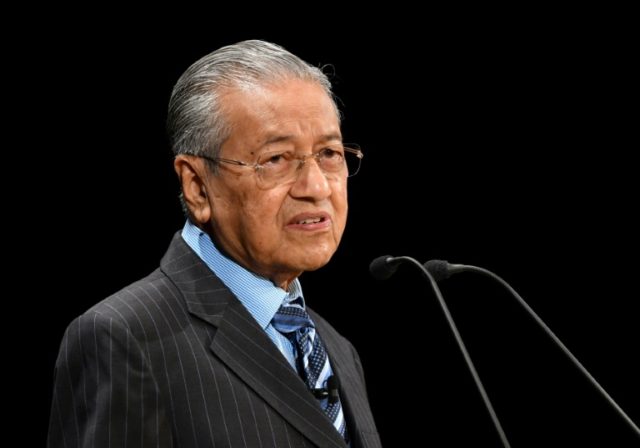A little over a month into his administration, Malaysia’s 92-year-old Prime Minister Mahathir Mohammed addressed the matter of Chinese territorial aggression in the South China Sea by recommending the use of “small boats” instead of “warships” to hold Beijing at bay.
“I think there should not be too many warships. Warships create tension. Someday, somebody might make some mistakes and there will be a fight, some ships will be lost, and there might be a war. We don’t want that,” Mahathir said during an interview on Tuesday with the South China Morning Post.
Instead, he suggested patrolling disputed islands in the South China Sea with “small boats” that would be “equipped to deal with pirates, not to fight another war.”
Mahathir’s idea is that China would also contribute small boats to the anti-piracy effort, working alongside the Association of Southeast Asian Nations (ASEAN) and perhaps even the U.S. Navy, whose inventory includes boats of all different sizes. He was essentially riffing on China’s insistence that it has militarized the South China Sea to fight pirates and protect international trade.
It is hard to tell if Mahathir was being idealistic, sarcastic, or shrewdly tactical in seeking to shame China into living up to its rhetoric:
“But if China wants to participate with small boats, they are welcome. Anybody, even the US if they want to participate – but don’t bring battleships here,” Mahathir said.
Asked if he was confident China would keep the waters open – Western powers say that Beijing’s island-building activity in the South China Sea may impede freedom of navigation – Mahathir said it was “to the benefit of China to have the seas open”.
“Because then, you will have more trade,” the premier said.
“You can’t expect all the goods going to China to change into Chinese ships before entering the Strait of Malacca and South China Sea.
“Goods from Europe and America, they will pass through the Strait of Malacca, and they should be free to pass through the Strait of Malacca, and then go to the South China Sea to reach China.
“You can’t expect an oil tanker belonging to the Americans to stop and pump the oil out into Chinese ships, I mean, that is ridiculous. The sea must always be open.”
That is what China keeps saying, but Beijing’s rhetoric does not match up with the level of firepower it has been moving into the disputed region. They do not need long-range nuclear-capable bombers, surface-to-air missile batteries, and minefields to combat piracy. Mahathir was asked if he would press Malaysia’s territorial claims in the Spratly Islands, a sore point in Malaysian politics because his predecessor and former protege, Najib Razak, was seen as too eager to trade away Malaysian territorial interests for Chinese cash.
“There are certain rocks which we have developed into islands. And we hope that we will stay on those islands, because it is a part of our keeping the sea safe from pirates and others,” he replied. “So we want to retain, of course, about four or five islands that we have occupied. The rest – whoever thinks it is theirs, they can occupy.”
The prime minister even made reference to proposals that Malaysia should rename the portion of the South China Sea it claims – which would be not just a symbolic act, but a first step toward claiming undersea oil and gas deposits – by saying his country wishes the region to remain welcoming and open for trade.
Mahathir took pains to stress he is not broadly antithetical to China, but he has problems with some of the deals struck with China under Razak, who he has accused of “selling off” Malaysia to China.
“When it involves giving contracts to China, borrowing huge sums of money from China, and the contract goes to China, and China contractors prefer to use their own workers from China, use everything imported from China, even the payment is not made here, it’s made in China … that kind of contract is not something that I welcome,” he said.
“I have always regarded China as a good neighbor, and also as a very big market for whatever it is that we produce. Malaysia is a trading nation. We need markets, so we can’t quarrel with such a big market,” said Mahathir.

COMMENTS
Please let us know if you're having issues with commenting.